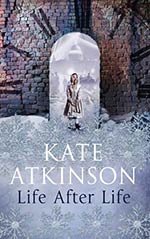
![]() Tar Daddoo
Tar Daddoo
1/21/2015
![]()
It is worth noting that Life After Life does not portray itself as Science Fiction; it is more of a mainstream novel, written by an author -- Kate Atkinson -- who is better known for mysteries. She might prefer the term Speculative Fiction.
What is the Science Fiction Premise?
In Life After Life, we observe Ursula's life repeating from the moment of birth whenever she dies. There appears to be some awareness that passes from life to life, but it is sketchy and not entirely trusted. Each life is slightly different, sometimes due to Ursula's actions and sometimes due to the choices of others.
Is the science of the premise explored?
The book is told almost entirely from Ursula's perspective and she has only a limited understanding of what's happening. The closest we come to a scientific explanation are her discussions with her therapist about mysticism and Eastern philosophies.
Even though there is little scientific explanation, I believe the author wants us to adopt a scientific approach and attitude about what is happening. We are not asked to think of this as magical or religious. We are asked to think of it as scientifically sensible and try to understand it that way. This is why I feel comfortable reviewing it as Science Fiction.
It is difficult to read Life After Life without thinking about Groundhog Day, a made-for-television movie called Christmas Every Day, or a Star Trek Next Generation episode called "Cause and Effect". These all feature time loops in which the interesting challenge is to break the loop. Life After Life is different in at least three ways. First, it is not just an event or a few days that repeats; it is Ursula's whole life. Second, it is unclear that the loop can be broken or that Ursula should even try to break it. Third, the author's intentions here are clearly less frivolous and not merely entertainment. We are asked to think very deeply about Ursula's situation.
Is the impact of the premise on an individual explored?
The novel is all about Ursula's life and how it changes as a consequence of her, albeit limited, ability to sense that her life is repeating. Sometimes her choices are profound and sometimes minor. The premise of the novel allows the author to explore the impact of these choices no matter their seeming importance.
Is the impact of the premise on society explored?
Since Ursula's understanding of her situation is limited, most of her choices center around changing her personal life as it unfolds through the first half of the twentieth century. Born in 1910, we watch Ursula face critical events and choices through her early life following World War I until her midlife during World War II. It is during World War II that we watch her interact with history.
How well written is the story?
This book is very well written. By its nature, it can be a bit confusing. Since neither Ursula nor anyone in her life understand what is happening, the author does not spell it out for us. We must achieve an understanding by watching Ursula's life repeat.
Since it is not uncommon for novels to present events out of sequence, it is easy to become confused by the author's approach to storytelling. I am not sure what is correct, but I found that with one exception I treated the scenes as in sequence with respect to Ursula's lives. It is hard to comprehend change from life to life without adopting this attitude. The exception is the two page opening scene in which Ursula first dies. This struck me as foreshadowing and out of sequence.
Can I recommend the book?
Yes, I recommend Life After Life.
Upon completing the book, I considered it confusing and pointless (not to mention rather dreary.) Waking up the next morning, I had a complete change of heart. Now, I view the book as masterful and deeply profound.
What changed?
I do not want to deny you the same journey. All I'll reveal is that I thought more deeply about all the evidence and abandoned the notion that the book is merely allegory, metaphor, or some other form of artistic license. Even though the novel is not described as such, when I adopted the perspective of Science Fiction the story became more satisfying with a clear though disturbing point.
Of course, it is possible that I imposed a bit of added interpretation to make the book comprehensible and satisfying. I am not beyond finding unconscious ways to make a long and difficult read gratifying. Even if that's true, I would still argue that Kate Atkinson has written a deeply thought-provoking book that guides rather than instructs. We must all find our own meaning (or lack thereof) in the book. Either way, there is much to think about.